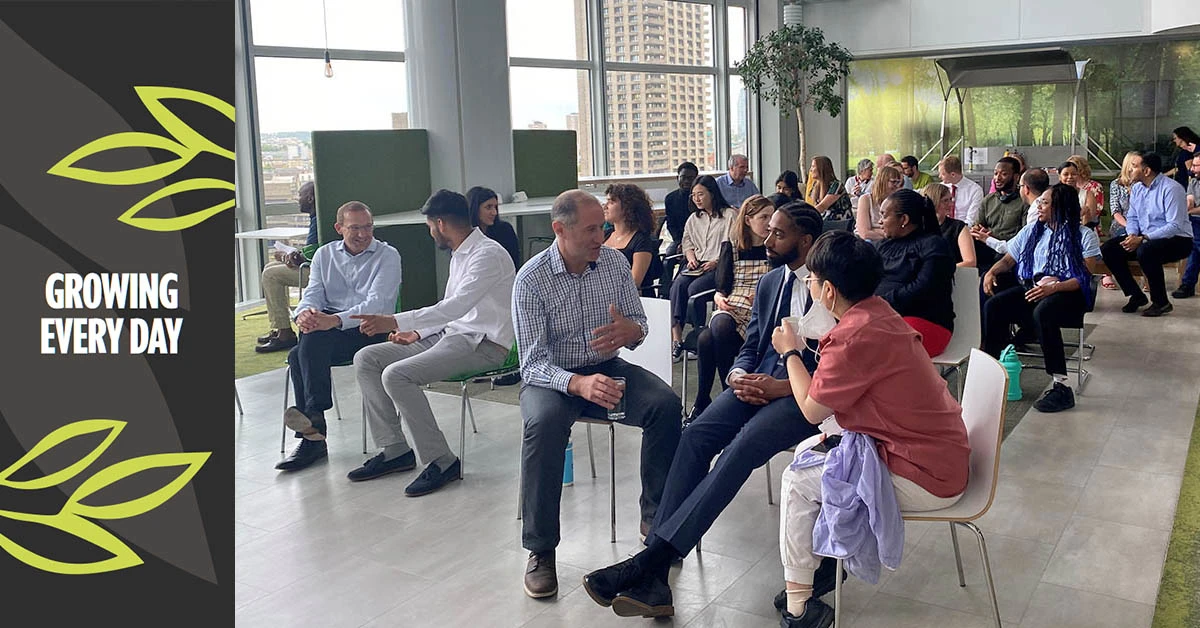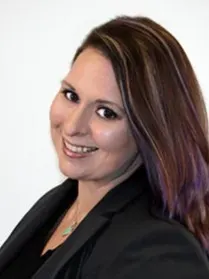Elsevier internship develops diverse talent across race, ethnicity and disability
August 10, 2022
By Elizabethe Westgård, Jared Goodman

Rising TIDE paid internships enable college students and recent grads from diverse backgrounds to work in product development, publishing, marketing, finance and tech
Caption: Rising TIDE interns in the UK meet with their “program buddies” at an ice-breaker during onboarding in Elsevier’s London Wall office.
Diverse teams are more innovative and productive than their non-diverse counterparts. They’re better able to identify creative solutions to problems and do so more quickly. According to a 2018 report by McKinsey opens in new tab/window, “more diverse companies are better able to attract top talent and improve their customer orientation, employee satisfaction and decision making.”
To foster diversity and inclusion and develop talent for future careers in business, Elsevier launched its Rising TIDE summer internship program in 2020 focusing on the dimensions of Race & Ethnicity and Disability. The name was inspired by the saying “a rising tide lifts all boats.” The program began with just a couple of interns but has since grown to 31 students across the US and UK. College students and graduates find out about the program from recruiters at university fairs, referrals from academic departments or by simply searching online. Those accepted into the program complete a 10- to 12-week internship in the areas of product development, publishing, marketing, finance or technology.
Benefits across the board


UK interns at Elsevier’s London Wall office.
Each intern is assigned to a team, a manager to oversee work projects, and a mentor (or “program buddy”) to help them navigate their new surroundings while sharing work and career insights. In some cases, their mentors are on-site, and in others, they meet virtually.
“The best part of my internship so far is getting to meet wonderful mentors who are passionate about their work,” said intern Mae Ghannouma opens in new tab/window, a student at the University of Florida Warrington College of Business opens in new tab/window who is working with the Research Marketing team. “Being able to lean on them, ask questions and help me network outside of my department has helped me grow more confident in my work ethic and skills.”
The mentors we spoke with said they, too, benefited from the experience.

Mae Ghannouma
“I feel like I’m making a difference in my intern’s confidence by providing them with helpful resources and ideas,” said Patreece Spence opens in new tab/window, a Publisher based in Philadelphia who mentored Jerome Boyce opens in new tab/window of North Carolina. “Talking to my intern always makes me feel better and puts a smile on my face!”
Intern Noah Pringle opens in new tab/window, who recently graduated from the Boston College Carroll School of Management opens in new tab/window, acknowledged that simply having a trusted person available to answer his questions and provide advice might seem simple, but it’s also essential.

Mentor Patreece Spence
“This is something that has been very helpful during my time here at Elsevier,” said Noah, who supported the HR team. “In general, I think this is something that is critical to have when joining a new organization.”
Figuring out who to talk to and where to go for answers can be daunting. It can even lead to stress, anxiety and inaction — especially if it’s your first time in a professional setting with a business as large and as spread out as Elsevier’s, with colleagues spanning the globe.

Noah Pringle
Knowing that, the mentors — also known as “program buddies” — take pride in their role as guides. “We weren't alone when we started,” said mentor Julie Yaeger opens in new tab/window, a Digital Sales Executive for Continental Education, based in St Louis. “It’s great to have someone to be that reference point and help out.”

Mentor Julie Yaeger
5 tips for mentors
Look (at) who’s talking: Be an active listener and ask questions along their journey.
One size does not fit all: Take a step back and ask your intern how they prefer to communicate and what they need to be successful.
Stay focused: When it comes to onboarding, focus on a few topics rather than trying to cover a wide range. Better to pick a narrow focus area and go deeply into that.
Limit your time: 30-minute to one-hour meetings per week work best.
Learn as you go: Don’t ignore the learning curve, adapt your approach along the way and seek out additional training for mentors as needed.
The mentor-mentee relationship is not unidirectional, however. For all the valuable advice and practical experience the buddies share, they say they’re getting just as much back from the interns.
“I learn as much from her as she from me,” said Linda Versteeg-Buschman of Amsterdam, Senior Acquisition Editor for Global Content Partners. “It’s also important to learn about the problems this young generation is struggling with, which I wouldn’t have known if not for being a mentor.”

Mentor Linda Versteeg-Buschman
Philippa Willson opens in new tab/window of Oxford, a Senior Business Analyst for Elsevier’s Technology business, is nearing retirement and wasn’t sure if she would relate to a young student.
“It can feel quite intimidating to be a mentor to someone who has a completely different perspective from mine,” she recalled. “I'm already finding out, however, that we have much more in common than I previously expected, especially with mechanisms for helping us do our work better.”

Mentor Philippa Willson
Going beyond the buzzwords

With his computer science background, Jerome Boyce is working as a research analyst for his internship.
Rising TIDE demonstrates the benefits of bringing unique and diverse voices together while providing a pathway for talented students to get valuable professional experience.
“I love how this internship is geared towards inclusivity,” said Jerome, a computer scientist working on a Master of Information Science degree at North Carolina Central University opens in new tab/window. “Often there is a giant pool of untapped talent sitting in underprivileged and underrepresented communities, and many companies miss out on this talent goldmine.”
That goldmine is something all companies should value.
“We are gaining such a wealth of diverse perspectives and are sowing seeds for future contributors to society,” said Ted Gies opens in new tab/window, Elsevier’s UX & Accessibility Program Manager, based in Dayton, Ohio.
Identifying that untapped talent can be an uphill struggle but not an insurmountable one.
“For me, one thing that was eye-opening was the recruiting process,” said Finance Manager Mark Lichtenberg. “The initial lack of diversity in the applicant pool was striking, leading us to try more and more channels. While we eventually found great candidates, it really showed how important it is for recruiters and hiring managers to cast as wide a net as possible.”
These challenges provide the opportunity to re-evaluate our current processes and determine the most inclusive approach.

Mentor Ted Gies
Driving tangible results
Further, the projects the interns take on are contributing directly to business objectives because there’s no better way to prepare future employees — and potential colleagues — than by giving them the same experiences they would face day-to-day on the job.
“I really appreciate the opportunity that has been given to me to work on meaningful projects that are important to the success of the organization,” said Noah, who worked with colleagues to compile data for an HR project.
Intern Rhiannon Jellow opens in new tab/window, who recently graduated with a BSc in Finance and Accounting from Brunel University opens in new tab/window in London, learned about “business strategies, processes and operations in a corporate environment.”
“The experience has been very exhilarating,” she said. “I have plenty of support yet so much freedom to learn for myself.”

Rhiannon Jellow
“We’re trying to give each intern a view into the work that we do, and what’s required to deliver exceptional quality for our customers,” said Larry Siedman opens in new tab/window, Elsevier’s VP of Marketing Effectiveness & Operations, based in New Jersey.
Jack Wharton opens in new tab/window of Gainesville, Florida, mentor and Product Owner for Elsevier Health, agrees that this approach has led to tangible results: “I love seeing my intern thriving in the Elsevier environment and growing as a professional,” he said. “That’s what it’s all about.”

Mentor Jack Wharton
What is Rising TIDE?
Standing for Tomorrow, Inclusion, Diversity and Equity, Elsevier’s paid summer internship program focuses on developing diverse talent in the areas of Race & Ethnicity and Disability.
When to apply: Applications are accepted beginning in January
Program length: 10- to 12-week summer program (June to September)
Areas of interest: Product Development, Publishing, Marketing, Finance, Technology
Contributors

EW

JG